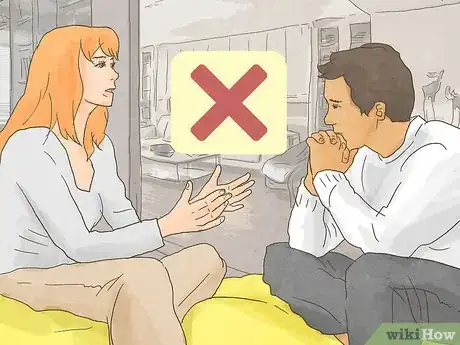This article was co-authored by Kateri Berasi, PsyD. Dr. Kateri Berasi is a Licensed Clinical Psychologist and the Founder of Transcendent Self, PLLC, a group therapy practice offering affirmative, collaborative, and intentional care, based in Brooklyn, New York. With over ten years of experience in the mental health field, Dr. Berasi specializes in working with adults from the LGBTQIA+ community and creative industries through individual therapy, couples counseling, group therapy, and costume therapy. She holds a BA in Psychology, Art History, and French Language and Literature from George Washington University and an MA and MEd in Mental Health Counseling from Columbia University. Dr. Berasi also holds a PsyD in Clinical Psychology from Long Island University.
This article has been viewed 4,473 times.
It is not uncommon for parents to address you with pronouns different from what you prefer. This is frustrating for people who have different pronouns than what they're called by their parents. This article will explain a few methods to communicate with your parents so that they correctly address you with your pronouns.
Steps
Communicating with Your Parents
-
1Tell them you need to talk to them about something important. Be sure they are calm and are not busy when you invite them to talk. If they are busy or in a bad mood, you might irritate them if you tell them you need to talk to them about something.
- The tone of the conversation really depends on your relationship with your parents. Are you close? Do they have a good sense of who you are and what you like? If your answers to both these questions are "yes," the conversation may be relatively more straightforward than if the answers are "no."
- If you don't have the best relationship with your parents, you may need to have more foundational conversations with them about who you are and who they know you to be.
-
2Pick a calm and quiet place to sit down to have the discussion. You don't want to have a serious discussion with your parents somewhere where music is blaring from a younger sibling's phone or with the television blasting a movie. You could also go somewhere you both enjoy going to, like the park.Advertisement
-
3Tell them about your preferred pronouns and about how you wish for your parents to use them. This can be a big toll on your parents, so be sure to be understanding both ways, from yours and your parents' perspective.
- "Mom/Dad, I wanted to talk to you about my preferred pronouns. I'd really appreciate it if you addressed me as (your preferred pronouns). I hope you understand that this is very important to me and I hope that you use my preferred pronouns from now on."
-
4Be prepared to answer any questions they have as they may be very confused. They might ask why you want to have different pronouns than the ones you originally had, what made you want to change, many other questions. Just answer all of their doubts truthfully and plainly. If you don't feel comfortable with answering or cannot answer a certain question, just tell your parent! Just because they are your parents do not mean that they can violate your privacy.
-
5Give your parent some time to get used to this change. They may not start using your preferred pronouns right away and might address you with the pronouns they originally used. Don't get angry at them; this is something new to them. Calmly and kindly correct them when they mess up your pronouns.
-
6Remember that not all parents will support this. Some parents do not support the use of preferred pronouns and will use whatever pronouns that they want. Not all parents support anything LGBTQ+.
-
7Be happy if they take the news well! This means not getting angry, annoyed, or disgusted, This means that there's nothing to worry about and your task is complete. Be proud of yourself and proud of what you've achieved -- there is no shame in using your preferred pronouns.
Coping with Rejection
-
1Be prepared in case your parents don't accept you. They might get angry or disgusted when you reveal your identity to them. Their minds are hard to change, but it is possible with effort and educational resources.
- Try and teach them about the LGBTQ+ community, and it isn't bad to be a part of it.
- Tell them that you're still you and still their child.
- Tell them that you're still like any other human being on this planet and haven't changed negatively.
-
2Have a backup plan for extreme emergencies. If your parents are dangerously against LGBTQ+, they may become violent. If you believe that that is the case, bring a trusted person with you when talking to your parents. If you think they might kick you out of the house, arrange to stay at a friend's or trusted family member's house in the event that they do indeed kick you out.
- Remember that just because they are your parents do not be that they are exempt from the law -- if they cross the line and become abusive, do not hesitate to call law enforcement.
-
3Surround yourself with supportive people. If your parents don't support you, find people who do.
- Remember, it really doesn't matter if your parents support you or not. Only you know who you truly are. Nobody else can change you. As long as you accept yourself, nothing else matters.
Warnings
- If they become violent, tell a trusted adult and seek help.⧼thumbs_response⧽
- If you are sure your parents will kick you out and you are dependent on them, then it is probably not a good idea to tell them about this.⧼thumbs_response⧽














-Step-16.webp)



-Step-26.webp)
-Step-16.webp)

















































